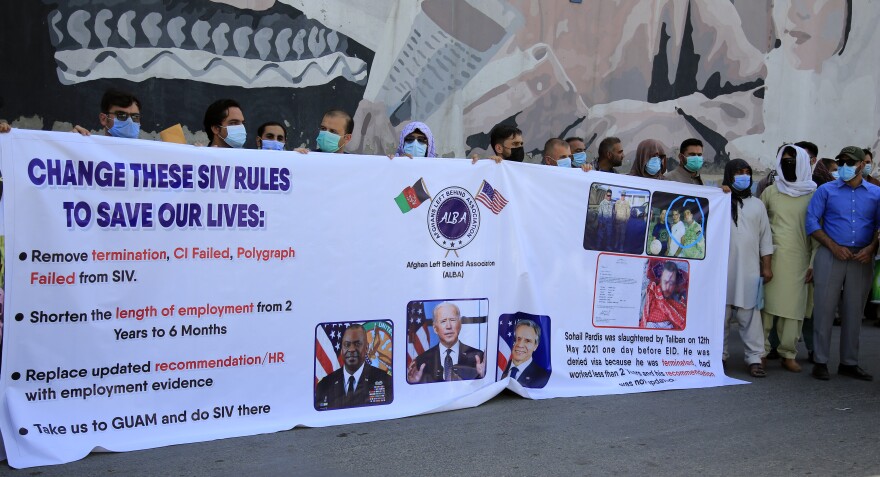Fida started working with U.S. Special Forces in 2006. In the following decade, the Afghan interpreter worked for USAID, U.S. Marines and finally the U.S. State Department. When he spoke to NPR back in 2018, Fida asked to only be identified by his first name for security reasons.
"I am proud to have worked with such wonderful people," he said of the Americans he met over the years, "And they stand by me."
But that did not seem to translate into Fida receiving the U.S. visa he'd been promised in exchange for risking his life alongside American forces. His application for a Special Immigrant Visa (SIV) was rejected several times. He was getting death threats from the Taliban, and he was worried. Fida wouldn't criticize the U.S. himself, but he said he was hearing more and more Afghans critical of American promises.
"In the future, people will think that, no, they broke the promises to a lot of interpreters who were shoulder-to-shoulder with them and who saved American lives," he said.
Finally, a U.S.-based group, the International Refugee Assistance Project (IRAP), took on his case. Last December, after several appeals, Fida and his family were cleared to immigrate to the US.
Weeks later, he was murdered by Taliban gunmen, in front of his 10-year-old son.
'A Sacred Duty'
Security in Afghanistan has only deteriorated since Fida's murder, and Afghans who worked with the U.S. military fear the Biden Administration's troop withdrawal has left them with no chance of escape. Taliban forces have made rapid gains across the country on the heels of the U.S. departure, and Afghans who worked with the government or the U.S. have been targeted for reprisals.
"Every one of them I asked, 'Do you have options? Can you get out if we don't save you?' And they all say, 'Are you kidding me? We're going to die,'" said Afghanistan veteran Matt Zeller.
Zeller works with a group called the Association of Wartime Allies, which has been pushing to extricate approximately 70,000 Afghan interpreters and family members. He says it's about keeping a promise made in exchange for their dangerous work with the U.S. military: if they served, they would get a visa to America.
"I was one of those people who looked people in the eye and made that promise on behalf of the United States. There are countless other veterans who were asked to make this promise on behalf of our country," said Zeller.

The State Department's method to keep that promise was the SIV program, which allowed interpreters and their families to resettle in the U.S. It's been plagued by delays and red-tape almost since its inception, and slowed to a trickle under the administration of former president Donald Trump.
At a briefing last week, the State Department explained its plan to expedite the evacuation.
"It's hard work and a sacred duty to fill our commitment to these people," said Tracey Jacobson, a former ambassador who now leads the State Department's newly created Afghanistan coordination task force.
"As President Biden said to these Afghans and their families, 'There is a home for you in the United States if you so choose, and we'll stand with you just as you stood with us,'" said Jacobson.
New Arrivals
The first 750 interpreters are expected to be flown out of Kabul this week and brought to Ft. Lee, Va., before resettling elsewhere in the U.S.
But advocates say these are the easiest cases –- those who have already completed most of the application and have made it to the Afghan capital.
"There are thousands and thousands of people sitting in that very early stage of the process, just waiting on the government to look at their applications," said Adam Bates with the International Refugee Assistance Project.
"Those people should not be left behind simply because the government took too long," he said.
Even if they get their applications through, the State Department says these Afghans must then make their way to Kabul Airport –- the only airstrip in the country still secured for U.S. forces. But a survey done by the Association of Wartime Allies estimated more than 40 percent of the eligible interpreters live in territory outside the Afghan government's control.
"Why didn't we take these people when we still had the personnel and equipment in place to do that? Why did we leave this to the 11th hour when it was going to be the most difficult?" asked Matt Zeller.
Copyright 2021 NPR. To see more, visit https://www.npr.org.





